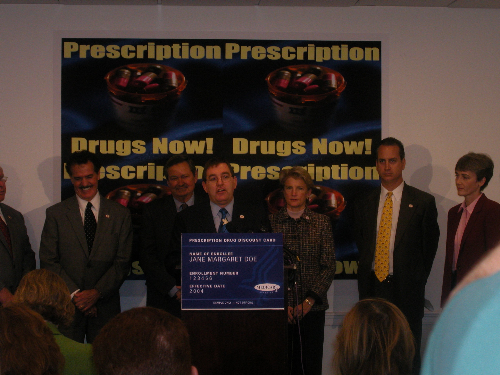Erasing the Mistakes of the Past: Reforming Medicare for the 21st Century
Washington, DC,
November 22, 2003
|
Michelle Stein
((202) 225-7772)
Erasing the Mistakes of the Past: Reforming Medicare for the 21st Century
An op-ed by Congressman Michael C. Burgess, M.D. (TX-26)
The U.S. Congress is on the verge of correcting a problem that has existed since Medicare was created in 1965. Four decades have passed since the inception of Medicare, and seniors still have no comprehensive drug benefit. As a physician, I would see how this impacted my patients on a daily basis. My Medicare patients would split pills or completely ignore my course of treatment because the cost of the prescription medications they needed were too high, and Medicare didn’t cover their cost. They had the ability to see me because Medicare would cover the cost of the doctor visit. But if prescription drugs were involved, because of a gaping hole in the program that can only be classified as “typical government,” they would often be unable to follow my recommended course of treatment due to a lack of drug coverage. This President and this Congress have had the courage to stand up and do what is right by correcting this gross oversight by helping millions of seniors pay for prescription drugs. The Medicare bill gives seniors immense purchasing power to meet their prescription drug needs, and indeed, all of their health needs. The prescription drug discount card will reduce the costs of prescription drugs by as much as 25%, and for some low-income seniors will provide an annual $600 subsidy for prescriptions drugs. The drug benefit alone will cover most drug costs for nearly half of seniors enrolled in Medicare, with minimal financial participation on the part of the beneficiary. Additionally, the bill would authorize consumer-based accounts dedicated to their holder’s health and well-being. Health Savings Accounts, which are authorized by this bill, allow individuals and families to put money, tax-free, into an investment type account dedicated to their medical costs. These accounts will give younger Americans the ability to save for the future medical expenses and give older Americans the ability to soften the financial strain of costly procedures or long term care insurance. By shifting Medicare to a more consumer-focused program, we improve beneficiaries’ health outcomes and make the program more accountable to the American taxpayer. There have been those that criticize this groundbreaking proposal before Congress as an attempt to privatize Medicare. Some have said that this bill will force seniors into HMOs. This is simply not true. The private market has been intimately involved in the Medicare program since day one. When President Johnson signed Medicare into law in 1965, he was asking hundreds of thousands of doctors, and their private practices and hospitals, to participate in this government program. The program then depended on the private market to provide a network of providers to care for seniors—the program today depends on the private market to provide that same care. Because the delivery of health care is so much more complex today that it was back in 1965—with a complex array of specialty providers, physician networks, insurance companies, pharmaceutical benefit managers, and mail order pharmacies—it would be irresponsible for the U.S. Congress to NOT rely on this same network that provides care everyday to millions of Americans when reforming how Medicare covers senior Americans. As for the claim that seniors will be forced into HMOs, the truth is that, under this bill, seniors will have more options to meet their health needs then they currently do. Under this proposal, seniors would certainly have the option to receive care through an HMO. But they would also have the option to receive their care through a Preferred Provider Organization (PPO), or if they like traditional Medicare, they can stay right were they are. The bill improves the choices available to seniors—it doesn’t limit them. Our work is far from done once this bill is passed. More work needs to be done to infuse more market-based principles into this government run program. More work will need to be done to improve the program so it not just focuses on covering as many Americans as possible, but actually improving their health. Congress will remain accountable and engaged. Medicare is a program that will need continual supervision throughout the years to ensure it is remaining a viable, worthy program. We will continue our oversight and responsibility on Medicare for future generations. This Medicare bill is the future of health care in our nation. |
Latest from twitter
Get the most up to date news from me on Twitter.

